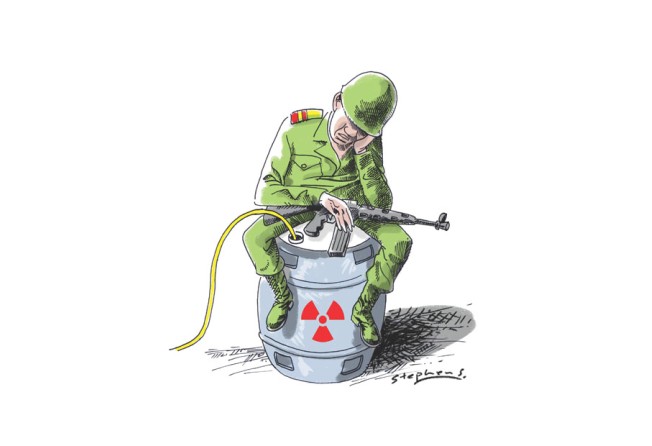China must play its part in preventing nuclear terrorism
Zhou Zunyou says with its large stockpile of highly enriched uranium and growing terrorist threat in Xinjiang, it's vital for China to beef up its nuclear security to meet today's challenges

President Xi Jinping began his first trip to Europe as China's top leader by taking part in the Third Nuclear Security Summit in The Hague last week. The aim of the third world summit, like its two predecessors, was to prevent nuclear terrorism around the globe.
Nuclear terrorism continues to be one of the most challenging threats to international security, something that was agreed upon and reaffirmed at the two previous summits, in Washington and Seoul. Indeed, a single act can destroy a large city, killing hundreds of thousands of people in the process, with political, economic and social repercussions far more devastating than the September 11 terror attacks.
In a 2010 interview, then US secretary of state Hillary Rodham Clinton spoke of world leaders' deep concern: "The biggest nightmare that many of us have is that one of these terrorist member organisations within this syndicate of terror will get their hands on a weapon of mass destruction."
The threat is real, the danger clear and present, given the potential for terrorists to acquire nuclear materials. Such material is, after all, available in hundreds of places around the world. With just 25kg of highly enriched uranium, it would be possible to construct a crude nuclear bomb.
Chinese involvement in the nuclear security summit process is crucial for the world, because the country is a major nuclear power. Such involvement is also vital for China, because the country is currently confronted with an unprecedented threat of terrorism.
That threat comes primarily from so-called East Turkestan forces who seek to change the region of Xinjiang into an independent Islamic state. In recent years, the separatist forces have staged numerous terrorist attacks using knives or homemade explosives. They have also tried using women "warriors" and carrying out suicide attacks. And they have begun to target passenger planes with the aim of causing an air disaster.
Since last year, China has seen a worrying escalation of terrorist violence. There was the jeep crash in the heart of Beijing last October that killed five people, including three attackers, and injured 40. Then, earlier this month, came the horrific knife massacre in Kunming that left 29 civilians dead and 143 others injured.
Like other countries, China is not immune to the threat of nuclear terrorism. In fact, the nation may well face greater dangers than others, given its large stockpile of highly enriched uranium and its rising influence in the international arena.
One potential barrier to the prevention of nuclear terrorism is the attitude among some Chinese, who believe the chances of terrorists getting hold of a nuclear bomb are slim. High-ranking officials may be well aware of the threat, but those lower down the order do not necessarily have the same understanding. So it's vital for all those in charge of China's nuclear security to remain vigilant and avoid complacency.
In recent years, Beijing has taken measures to bolster its nuclear security and particularly its capacity for dealing with nuclear emergencies - especially after the first nuclear security summit in 2010 and the Fukushima nuclear disaster in Japan in 2011. It has committed to many international legal instruments on nuclear security, including on nuclear terrorism, and adopted corresponding security measures as required by UN Security Council Resolution 1540. By fulfilling its international obligations, China has made significant progress.
However, despite these efforts and a record of accident-free operations for the past 50 years, there is still plenty of room for improvement.
First and foremost, China needs to bring its current regulations on nuclear security into line with international standards so that they meet today's security challenges.
The current regulations, mostly adopted before the 9/11 attacks, are so outdated that they don't even mention "nuclear terrorism" for example.
China also has no general legal framework for the use of nuclear energy, beyond the law on the prevention and control of radioactive contamination. A draft of its Nuclear Energy Law - discussed since 1984 - remains on the shelf, largely due to inter-agency disagreements.
This situation looks likely to change soon, given Xi's comments at The Hague summit: "We are in the process of drafting national regulations with a view to putting nuclear security on an institutional and legal footing."
Nuclear terrorism is a global threat and no one country can defeat it on its own. The international fight requires a concerted effort and strong co-operation from all nations. Terrorism has been identified as the most serious crime against humanity. Nuclear terrorism is clearly the most extreme form. As one of the few nuclear powers, China has a special responsibility to protect its own people and those of other nations from this threat. Meanwhile, it must also play a stronger role in international co-operation on nuclear security.
Zhou Zunyou, head of the China section at Germany's Max Planck Institute for Foreign and International Criminal Law, is working on a research project on counterterrorism legislation